Babies' Castle, Hawkhurst, Kent
In 1883, a Mr Theodore Moillet donated a pair of villas and an acre of meadowland on Cranbrook Road, Hawkhurst, for establishing a Barnardo's home for babies. A year later, twenty-six babies were being cared for in the home which local people had named 'Babies' Castle.' With increasing pressure for more places to be provided, an substantial extension to the home was soon erected. The new building, which could house up to 120 babies, contained dormitories, nurseries and playrooms plus a dispensary and a doctor's room, with the original villas now being used to care for infectious cases. On 9th August 1886, the new premises received a grand official opening by a royal party consisting of Princess Mary Adelaide, Duchess of Teck, together with her sons Price Adolphus and Prince George, and her daughter Princess Victoria.
The location and layout of the home is shown on the 1898 map below.
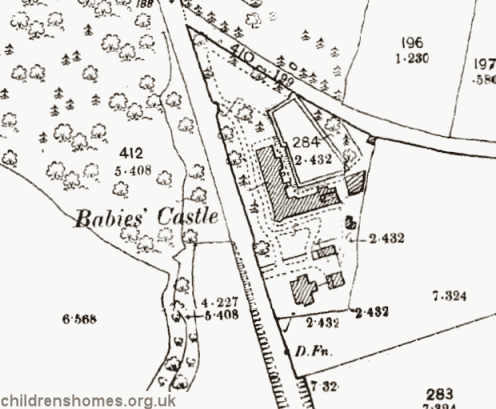
Babies' Castle site, Hawkhurst, c.1898.
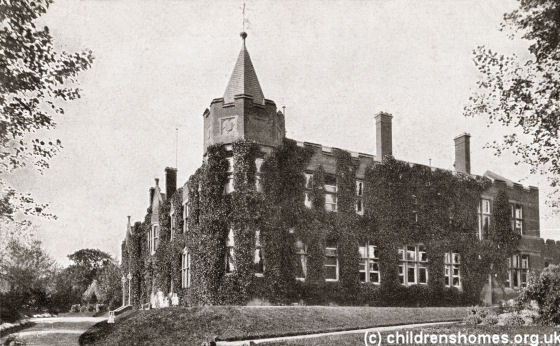
Babies' Castle, Hawkhurst, early 1900s. © Peter Higginbotham
Originally, admission to Babies' Castle was restricted to the under-threes. In 1908, this was extended to include children under the age of age of eight, particularly focusing on children whose physical condition made them unsuitable for boarding out with foster parents. In 1930, the home was state to have 70 places for those aged 1 to 6, while in 1935 it could take 80 children aged 1 to 3.
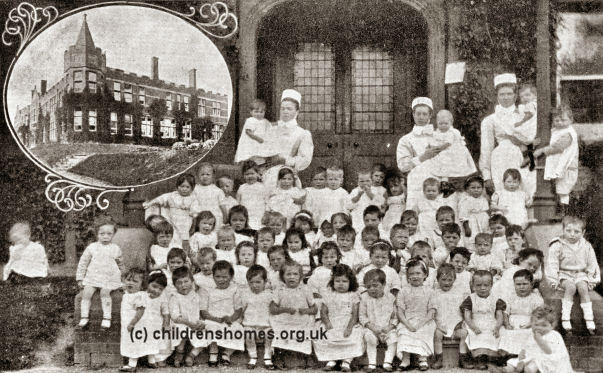
Babies' Castle staff and children, early 1900s. © Peter Higginbotham
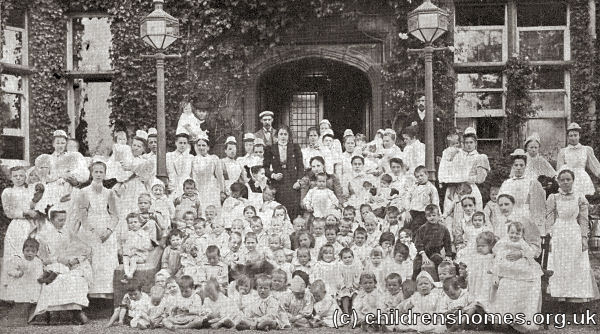
Babies' Castle staff and children, early 1900s. © Peter Higginbotham
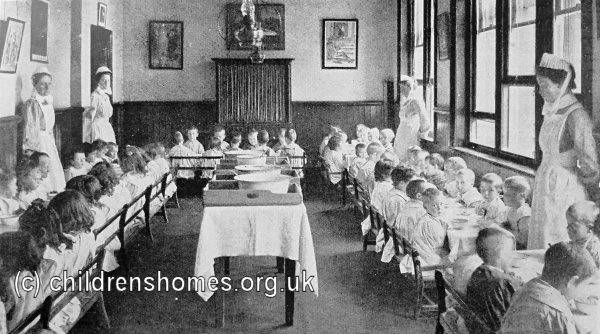
Babies' Castle — breakfast time, c.1908. © Peter Higginbotham
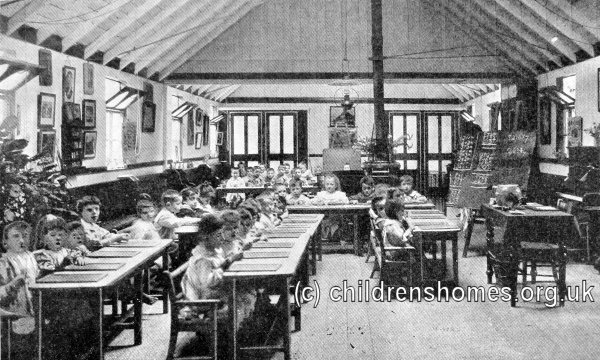
Babies' Castle — classroom, c.1908. © Peter Higginbotham
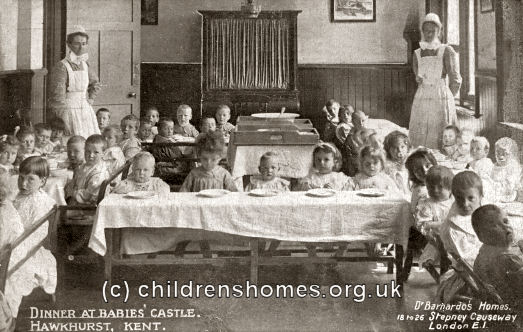
Babies' Castle — dinner time, early 1900s. © Peter Higginbotham
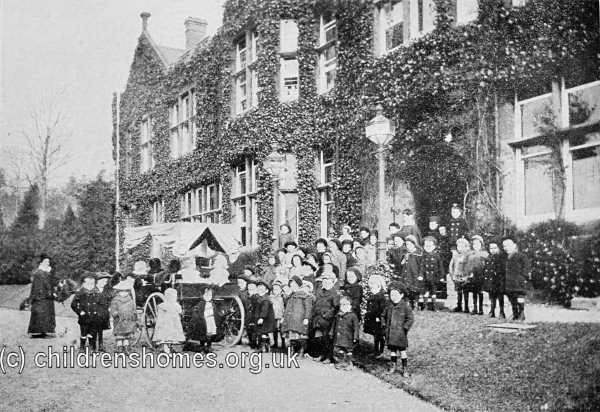
Babies' Castle — preparing for a walk, c.1908. © Peter Higginbotham
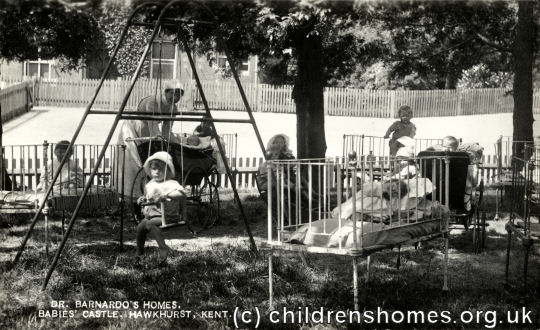
Babies' Castle — in the shade, c.1910. © Peter Higginbotham
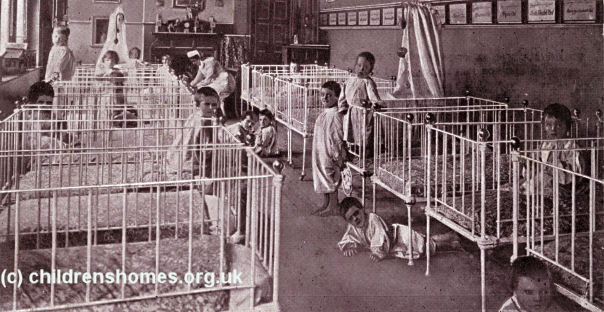
Babies' Castle — bedtime, early 1900s. © Peter Higginbotham
In 1937, with the Second World War on the horizon, Home Office officials visited Babies' Castle and children from a few months old upwards participated in gas-mask fitting trials.
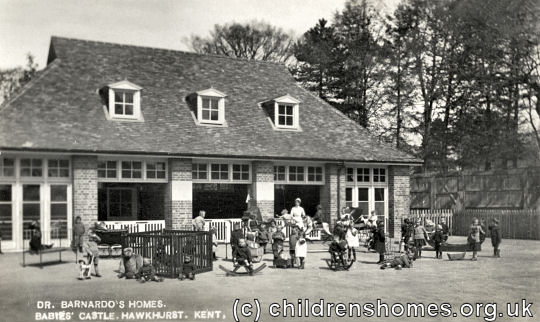
Babies' Castle — garden annexe, c.1910. © Peter Higginbotham
In May 1959, it was reported that a Townswomen's Guild in the area had expressed "considerable surprise" at the large number of "coloured infants" residing at the Babies' Castle. The group warned that unless they could be assured that no white child was being refused admission as a result of this, they would no longer feel able to continue supporting Barnardo's. After the Townswomen were reassured, the matter was dropped.
By 1964, the home, now designated as a nursery, offered just 48 places.
Babies' Castle, by now known as Hawkhurst Castle, finally closed in 1965. The premises were subsequently used as an elderly care home. In 2005, the site was sold for redevelopment for residential use but the old buildings have thus far been left to decay.
Records
Note: many repositories impose a closure period of up to 100 years for records identifying individuals. Before travelling a long distance, always check that the records you want to consult will be available.
- Barnardo's 'Making Connections' and Family History Services — for enquiries relating the records of children formerly in the care of Barnardo's and those of other organisations absorbed by them.
Bibliography
- Barnardo, Syrie Louise, and Marchant, James Memoirs of the Late Dr Barnardo (Hodder & Stoughton, 1907)
- Batt, J.H. Dr. Barnardo: The Foster-Father of "Nobody's Children" (S.W. Partridge, 1904)
- Bready, J. Wesley Doctor Barnardo (Allen & Unwin, 1930)
- Higginbotham, Peter Children's Homes: A History of Institutional Care for Britain's Young (2017, Pen & Sword)
- Rose, June For the Sake of the Children: Inside Dr. Barnardo's: 120 years of caring for children (Hodder & Stoughton, 1987)
- Wagner, Gillian Barnardo (Weidenfeld & Nicholson, 1979)
Links
- The Barnardo's website.
- The Goldonian Website — memories and information from former Barnardo's children.
Except where indicated, this page () © Peter Higginbotham. Contents may not be reproduced without permission.


